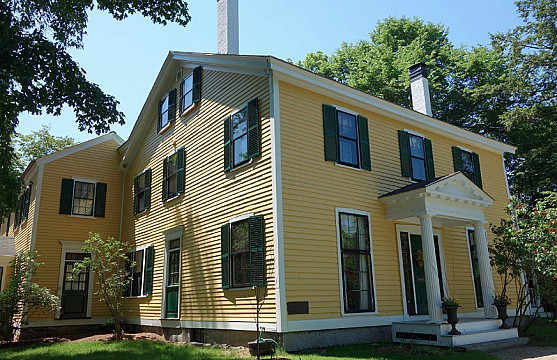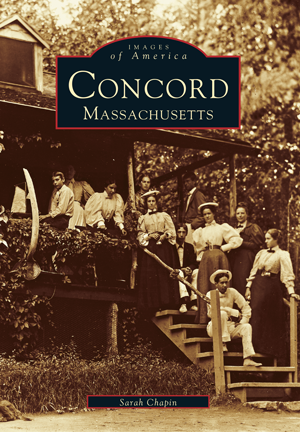Yellow House
255 Main Street, Concord, Massachusetts
Built sometime between 1819 and 1830, for Josiah Davis (1765-1847), a shopkeeper and real estate developer whose fortunes flourished before going bankrupt after the Financial Panic of 1837. By 1849, John Thoreau's pencil manufacturing business was sufficiently successful to allow his family to take their pick of the finest houses then on offer in Concord and that year he paid Daniel Shattuck $1,450 for the "Yellow House" on Main Street. It is best remembered as the home of John's celebrated son, Henry David Thoreau, though it is formally known as the Thoreau-Alcott House for its other famous literary occupant from 1877, Louisa May Alcott, author of Little Women...

This house is best associated with...
Before the Thoreau family moved in, they carried out a long list of renovations that included raising the ceilings throughout to 9-feet and Henry helped attach the pencil shop from their previous home onto the new one. Nonetheless, by the time the works were completed in August, 1850, Henry was not happy about moving in, "at all!" But, he quickly came around to life in the Yellow House, occupying the attic floor which stretched the length of house and looked out over the town at one end, where he positioned his desk, and the river at the other end where he placed his bed. Once settled in, he wrote: “I have, as it were, my own sun and moon and stars, and a little world all to myself”.
"A Little World All to Myself"
This was to be Thoreau's home from 1850 until his premature death in 1862, and he paid board and rent to his father through a combination of lecturing and manual labor but predominantly as a civil engineer. Here, he kept all his surveying equipment mixed in with whatever treasures he found that included: Indian arrowheads, a collection of minerals, bird's eggs, turtles, insects and his herbarium plus various mosses and lichens etc. When his father purchased more land behind the house between it and the river, Henry was able to moor his boat on their property and planted an orchard of apple trees.
Louisa May Alcott
After Henry's mother died in 1872, she left the house to her only surviving child (Henry's sister), Sophia Thoreau, who lived here for a further four years before she too died. In the following year (1877), Louisa May Alcott helped her widowed sister, Anna, purchase the Yellow House for $4,500 from the estate of Sophia Thoreau. That year, Anna moved in with her two sons and her elderly mother, Abby, who died just eleven days later. After Abby died, Louisa and her father (Bronson) joined Anna and the boys at Yellow House.
The bustling household and particularly Louisa's nephews, "the lion hunters," did not always make for conducive setting for Louisa's writing. Although it was here that she is credited for finishing the final book in the March family trilogy, Jo's Boys, she also spent part of every year in Boston, renting various places until she bought 10 Louisburg Square.
Today
Louisa's sister, Mrs Anna Pratt, died here in 1893, when the house then passed to Anna's eldest son, Frederic Alcott Pratt, whose widow lived on here until 1934. Since then, it has passed through several hands but it remains a private family home. In 2019, the 6-bedroom, 5,807-square foot house was placed on the market, priced at $2.6 million.
"A Little World All to Myself"
This was to be Thoreau's home from 1850 until his premature death in 1862, and he paid board and rent to his father through a combination of lecturing and manual labor but predominantly as a civil engineer. Here, he kept all his surveying equipment mixed in with whatever treasures he found that included: Indian arrowheads, a collection of minerals, bird's eggs, turtles, insects and his herbarium plus various mosses and lichens etc. When his father purchased more land behind the house between it and the river, Henry was able to moor his boat on their property and planted an orchard of apple trees.
Louisa May Alcott
After Henry's mother died in 1872, she left the house to her only surviving child (Henry's sister), Sophia Thoreau, who lived here for a further four years before she too died. In the following year (1877), Louisa May Alcott helped her widowed sister, Anna, purchase the Yellow House for $4,500 from the estate of Sophia Thoreau. That year, Anna moved in with her two sons and her elderly mother, Abby, who died just eleven days later. After Abby died, Louisa and her father (Bronson) joined Anna and the boys at Yellow House.
The bustling household and particularly Louisa's nephews, "the lion hunters," did not always make for conducive setting for Louisa's writing. Although it was here that she is credited for finishing the final book in the March family trilogy, Jo's Boys, she also spent part of every year in Boston, renting various places until she bought 10 Louisburg Square.
Today
Louisa's sister, Mrs Anna Pratt, died here in 1893, when the house then passed to Anna's eldest son, Frederic Alcott Pratt, whose widow lived on here until 1934. Since then, it has passed through several hands but it remains a private family home. In 2019, the 6-bedroom, 5,807-square foot house was placed on the market, priced at $2.6 million.







